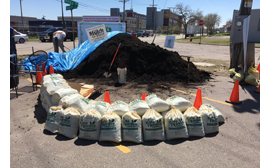 |
||||||||||||||||||||||||||||||
| Past Issues | Subscribe | Send to a Friend | compostingcouncil.org | ||||||||||||||||||||||||||||||
|
But that demand has snowballed and become an avalanche. A current scan of state bill summaries in Legiscan shows more than 100 bills in statehouses today that involve composting or compostable products - compared to just a handful that used to be introduced annually just five years ago! And with the election of President Joe Biden, we expect infrastructure bills and agencies like USDA and EPA to include compost and regenerative agriculture in efforts to increase healthy soil and mitigate climate change. The current explosion of state bills was accelerated by the collapse of the traditional recycling industry under pressure of the China Sword, the policy that increasingly rejected contamination that came with a push in the U.S. to single-stream recycling in the past decade. Additionally, the necessity of pandemic-related single-use products last year increased consumers' awareness and desire to reduce, recycle, and compost materials that are being landfilled and burned. What’s Target Organics Got To Do With It? This tsunami of interest presents a structural challenge that the Target Organics program is turning into an opportunity. While industry studies (and we are undertaking our own in the next few months - so stay tuned) show that less than 10% of the compost facilities in the U.S. have expanded to food waste, we hope to grow that number to fill in the “compost deserts” - areas with no compost programs - in the next five years with campaigns and tools for municipalities. Our Target Organics Hub will be released in its “beta” form in Q2 with a curated collection of tools for cities and counties to plan and organize their programs. Through the hard work and dedication of two member-led committees - The Target Organics Hub and Roadmap committees - these resources are taking shape and will provide activists, elected officials and those in the industry with all the best work of the organics industry in one place. The Hub will include our new Model Zoning Template, which is nearly completed; a Zoning Brief (see the article below), compost use information, and information about a decision path municipalities and others can take in designing new facilities. USCC began working on this project in 2018 on the logic that counties and cities are the controllers of waste flow due to their responsibility for waste management. To verify what the compost industry had already learned from the USCC’s member organizations about impediments to growing oases in compost deserts, the Target Organics program leaders surveyed municipalities and found these obstacles:
Visit the Target Organics page to learn about the committees and their work.
With more than two decades in the composting industry, Jeff has been involved with the USCC through the Market Development Committee, mentorship programs, the annual conference, and has previously served multiple terms on the Board. Jeff brings valuable knowledge and insight about the industry and the USCC. Joe DiNorscia has agreed to serve the balance of the year on the Executive Committee as Treasurer, filling Faldik's seat. Joe served two other annual terms in the same role.
As an undergrad, she studied emerging challenges in environmental justice, resource management and climate change mitigation. Hessa volunteered at NC State Compost Learning Lab for two summers before moving to Morehead City and studying the effects of ocean microplastics pollution on seabirds. Solid waste management is a big area of interest for Hessa, and accelerating efforts toward strong management and mitigation are at the center of her career goals. Hessa's interests include environmental regulations, science communication and community outreach, and she hopes to pursue a degree in environmental law in the future. Hessa can be reached at support@compostingcouncil.org. Join Dan Lawson and Ash Richards, City of Philadelphia; Michael Martinez, LA Compost; and Josh Singer, Washington, DC Parks, for a discussion of how composting and compost use is a particularly good combination for government parks programs and urban agriculture.
The webinar is March 25, 2-3 p.m. ET. Cost is free for USCC members, $25 for non-members.
Help the USCC expand. Join the USCC’s Strategic Alliances Committee to build the internal system and communication tools for partnerships. These connect many committees within the USCC, and committees use these to develop mutually beneficial partnerships with other like-minded organizations. Email Hilary Nichols at hnichols@compostingcouncil.org.
The winners of the virtual competition for all attendees of VIRTUAL COMPOST2021 are as follows: Ken Bannister - Full registration for COMPOST2022 in Austin, Texas Eliot Schneider - One night stay for COMPOST2022 in Austin, Texas Melody Tennant - $150 to the USCC Store Hana Previte - USCC Kleen Kanteen Water Bottle
A second round of stakeholder comments will take place in spring. Meanwhile, the Sustainable Development Code team has published a Composting Brief in conjunction with the USCC that gives municipalities, advocates and others an overview of the ways that composting is often placed in government codes, from zoning to state permitting and other applications. It is intended as a high-level view to help municipalities begin thinking about how to add zoning for composting to their local zoning codes. The USCC Model Zoning Template will be added to the document when it is complete. Members are getting the first look at the new Brief with this announcement. Read the full Sustainable Development Code Composting Brief.
"I pursued getting my CCOM because I felt it was the next step in my composting journey. My primary goal is to cultivate composting awareness among individuals and businesses. I’ll use my certification, knowledge and passion to inspire and educate others to compost."
"As the world shifts and evolves in unexpected ways, we have all had to pivot and be flexible with our business practices. I made the decision to pursue professional certification so as to maintain best practices, continue the marketability of ReCultivateNY’s competitive methodology, show female presence in a male-dominated industry, and to continue to take my business and what I have learned into the next phases." The Chapter Advisory Committee has completed its new Chapter Admission Criteria process, which was approved by the Board of Directors in February. Key elements include: Applying chapters must meet a minimum number of points for :
Applying chapters meeting the minimum points must have an interview process with the CAC. More details to distribute to candidate chapters are being finalized, and the applications will be going out before the end of March to potential applying chapters.
The Minnesota Composting Council held the second of its Compost Use webinar series, Compost Specifications and Projects, in February, with speakers from MNDOT and a state landscape architecture firm. The New Jersey Composting Council held its spring members meeting online in March. The North Carolina Composting Council continues to "pivot” with Sustainable Spirits happy hour held online.
In her role with the mayor’s Office of Resilience, Natasha focuses on creating programs that increase wasted food diversion from landfill as part of the city’s Climate Action and Food Access plans. This includes programs that recover edible surplus food to feed food insecure residents and collaborate with external partners to create decentralized composting systems that then benefits municipal urban agriculture. In her role with the city, she administers a citywide Sustainability Ambassador Leadership Program, which she created, that graduates just under 100 participants per year.
If you are a young professional in the composting industry, we want to help you. Here is your one chance to be part of our free mentoring program with one of our senior USCC members. The 2021 Mentoring Program opens for applications on March 15 and closes April 5, 2021.
Reach out to Committee Chair Shelby Hoglund at ypmentoring.uscc@gmail.com if you have questions.
The first happy hour of the year took place in March. YPs from different backgrounds had diversified conversations varying from regional chapters, advocacy, biochar, compostable plastics and more. Mark your calendar for the upcoming gathering on April 2. Susan Thoman, Principal and Managing Director of Compost Manufacturing Alliance, has graciously agreed to join the YP Happy Hour and share her knowledge and expertise in the composting industry. Click on the Zoom link for meeting details, and learn more about the YPs Group here. This is a recurring meeting every first Friday of the month.
For the third consecutive year, World Centric is proud to be named No. 17 of 150 Top Impact Companies for 2021. This award by Real Leaders®, the world’s first sustainable business and leadership magazine dedicated to inspiring better leaders for a better world, recognizes leading social impact businesses around the globe. Other 2021 award winners include game-changers such as Beyond Meat, Miyoko’s, change.org, and dozens of other well-known brands.
Nominated companies are ranked based on their “Force For Good” score: 3-Year Growth Rate x Revenue x Impact Score. The 150 Top Impact companies chosen are applying capitalism for greater profit and greater good, driving a dynamic segment of the economy, and bearing a new vision of business that demonstrates that every transaction is an opportunity for growth and a better world.
“Making a positive impact has been at the core of World Centric from day one, from the products we create to our support of communities around the world through our giving program,” said Mark Stephany, World Centric’s Senior Vice President of Sales. “To be named a Top Impact Company by Real Leaders for the third year in a row is an honor that helps us drive World Centric’s mission even further.”
Two USCC members, Celeste McMickle, Director of Client Solutions TRUE Certification, U.S. Green Building Council, and Ben Parry, CEO, Compost Crew, are amongst the Waste360’s 40 under 40 list. This is the sixth annual 40 Under 40 awards program, which honors the next generation of leaders who are shaping the future of the waste and recycling industry. Congratulations, Celeste and Ben!
The city is exploring the option of a residential curbside composting program this spring. Medford released a Request for Proposals on March 1 seeking companies that offer subscription organics collection to residents. (Source: Alex Newman, Patch)
DCBs will be used by residents and businesses to collect organic waste. After filling the bags, individuals will place the bags in their trash for collection. Trash will be collected as usual, and then the DCBs will be sorted from the trash after collection so that they can be sent to compost and/or anaerobic digestion facilities. DCBs will be used to collect organic waste, such as food waste and food-soiled paper, but not yard waste. DCBs must have adequate strength and durability to withstand co-collection and hauling with trash. DCBs must be comprised of material that is capable of decomposing in an aerobic environment and be certified as compostable by the Biodegradable Products Institute (BPI). Key dates Tuesday, March 2, 2021, 1-3 p.m. CST: Pre-proposal conference to be held virtually via Webex; contact sholl@recyclingandenergy.org to request meeting invite. RFP documents and additional information at RecyclingAndEnergy.org/Vendors. The US Composting Council seeks to hire an individual or group to produce two documents:
Submittal date: March 17, 2021, 3 p.m. ET. Award date: March 31, 2021 Delivery dates:
In response to inquiries, the USCC will accept proposals for either or both objectives. View the full RFP here.
The ideal candidate:
In June, there will be a two-day Compost Manufacturing: Principles & Practices training held in California, which will include an optional third day of site tours, offered in both Northern and Southern California. Also in June, CREF will host a research webinar on carbon sequestration. Based on the idea that conditions improve, COVID-wise, the Compost Operations Training Course (COTC) program will resume in August with three trainings scheduled in different parts of the country in 2021. As it gets closer, the full schedule of COTCs in 2021 and leading into early 2022 will be announced. Wayne Howard is the program manager for all the trainings. If you have any questions about upcoming trainings this year, he can be reached at waynehoward@compostfoundation.org or there is always updated information on the Foundation’s website: www.compostfoundation.org/Education/COTC.
In preparing for ICAW 2021, which will be May 2-8, there has been a lot of activity planning for the annual event. On February 22, ICAW volunteer coordinators from across the country attended a training to hear what people have done in prior years to recognize ICAW in their states and to share plans for this year. It was agreed by most that this year will probably be a hybrid, meaning a mix of promoting ICAW through social media, webinars, Zoom meetings (like was done in 2020) and socially-distanced outside events. If anyone is interested in becoming an ICAW volunteer, contact Beth Simone at bethsimone@compostfoundation.org. Also, the new poster for 2021 is printed. Some will be receiving them in the mail, but it is also available for purchase in the ICAW store.
|
||||||||||||||||||||||||||||||
 When we picked the name Target Organics to describe our member-led effort to provide guidance to municipalities that need composting programs, we had some sense of the escalating demand for compost and ecosystem services.
When we picked the name Target Organics to describe our member-led effort to provide guidance to municipalities that need composting programs, we had some sense of the escalating demand for compost and ecosystem services.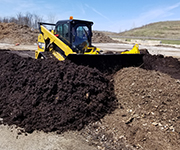
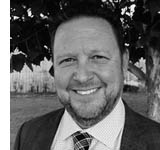 The US Composting Council announces today that Jeff Ziegenbein is returning to the USCC Board of Directors. Due to the recent acquisition of New Earth, Inc. by WeCare Denali, LLC, Russell Faldik has resigned his seat on the Board in accordance with USCC bylaws Section 9. We would like to thank Russell for his time, service and leadership. As a result of the vacated board seat, the Board of Directors, per the
The US Composting Council announces today that Jeff Ziegenbein is returning to the USCC Board of Directors. Due to the recent acquisition of New Earth, Inc. by WeCare Denali, LLC, Russell Faldik has resigned his seat on the Board in accordance with USCC bylaws Section 9. We would like to thank Russell for his time, service and leadership. As a result of the vacated board seat, the Board of Directors, per the  The USCC is pleased to welcome Hessa Al Maghlouth to the staff. As the Administrative Assistant, Hessa will be supporting the day-to-day operations of the USCC by directing general communications, interfacing with members and fulfilling store orders. Hessa grew up in Saudi Arabia, where irrigation challenges and growing industrial agriculture are key issues affecting soil quality and sustainable farming practices. She moved to North Carolina in 2014 to attend NC State University. She graduated from NC State in May 2020, earning a bachelor's degree in environmental sciences with a focus on marine ecology.
The USCC is pleased to welcome Hessa Al Maghlouth to the staff. As the Administrative Assistant, Hessa will be supporting the day-to-day operations of the USCC by directing general communications, interfacing with members and fulfilling store orders. Hessa grew up in Saudi Arabia, where irrigation challenges and growing industrial agriculture are key issues affecting soil quality and sustainable farming practices. She moved to North Carolina in 2014 to attend NC State University. She graduated from NC State in May 2020, earning a bachelor's degree in environmental sciences with a focus on marine ecology.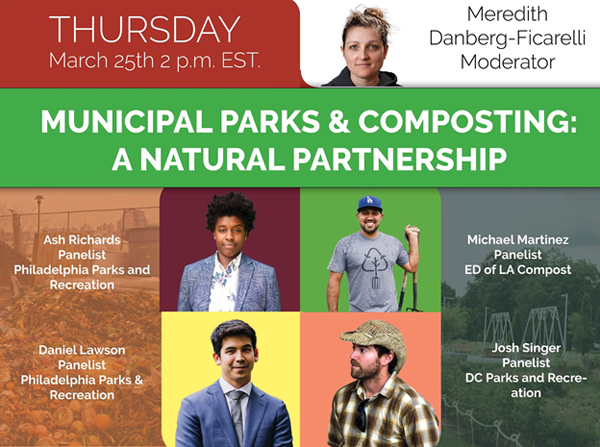
 If you did not get a chance to attend VIRTUAL COMPOST2021, now you can catch up on all of the action. Recordings of more than 25 sessions are now available on the USCC website for purchase. Members can access all of the proceedings for just $99. The international perspective was offered by compost and organics recycling program leaders from around the world. Three concurrent tracks offered a total of 15 sessions with industry leading speakers from a variety of areas of expertise. Virtual tours of
If you did not get a chance to attend VIRTUAL COMPOST2021, now you can catch up on all of the action. Recordings of more than 25 sessions are now available on the USCC website for purchase. Members can access all of the proceedings for just $99. The international perspective was offered by compost and organics recycling program leaders from around the world. Three concurrent tracks offered a total of 15 sessions with industry leading speakers from a variety of areas of expertise. Virtual tours of 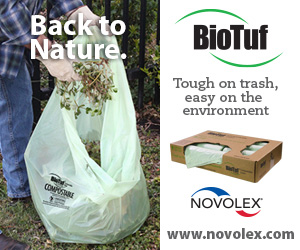
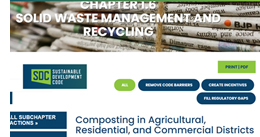 USCC’s Zoning Task Force has been working to integrate comments and suggestions from stakeholders to the Model Zoning Template being developed for 2021 Release. More than 15 robust comments asking for changes to the three focus areas - large composting, small composting and on-farm composting - were submitted, along with requests for zoning language addressing "consolidation” areas (areas where collectors of organic waste aggregate collection for transport to compost facilities).
USCC’s Zoning Task Force has been working to integrate comments and suggestions from stakeholders to the Model Zoning Template being developed for 2021 Release. More than 15 robust comments asking for changes to the three focus areas - large composting, small composting and on-farm composting - were submitted, along with requests for zoning language addressing "consolidation” areas (areas where collectors of organic waste aggregate collection for transport to compost facilities). Greg Mankowski is the Compost Manager at Urban Roots. For the last three and a half years, he has grown the community scale composting program to more than 300 subscribers. The work that is most meaningful to him is developing his composting skills and sharing knowledge with his community. His primary goal is to see no food sent to the landfill by creating awareness for and frameworks to make composting available everywhere. Greg loves teaching others about compost through workshops and other learning opportunities. A few of his other passions include skateboarding, hiking around Lake Michigan’s shore, and attending live music (COVID permitting). He currently lives in Grand Rapids, Mich., with his fiancée.
Greg Mankowski is the Compost Manager at Urban Roots. For the last three and a half years, he has grown the community scale composting program to more than 300 subscribers. The work that is most meaningful to him is developing his composting skills and sharing knowledge with his community. His primary goal is to see no food sent to the landfill by creating awareness for and frameworks to make composting available everywhere. Greg loves teaching others about compost through workshops and other learning opportunities. A few of his other passions include skateboarding, hiking around Lake Michigan’s shore, and attending live music (COVID permitting). He currently lives in Grand Rapids, Mich., with his fiancée. Allison Lee Forstmann is the founder & CEO of ReCultivateNY, a women-led food waste repurposing business in the state of New York. After 20 years of corporate experience in product development and brand strategy in luxury jewelry, electronics and candy, Allison comes to the table with enormous executive prowess and a creative, analytic mind. At every turn in her career, Allison has been known for her keen ability to identify setbacks and create effective solutions. In 2015, Allison decided to marry her business savvy with her passion for the environment and farming and founded RecultivateNY to create custom, on-site compost processes for farms, corporate campuses, community organizations, New York State Department of Environmental Conservation Brownfields and more. ReCultivateNY converts commercial inputs to organic, repurposes on-site materials, and identifies other repurposing opportunities by prioritizing clients’ ESG objectives. ReCultivateNY works with all areas of food waste and recyclables to identify a master plan of processing and reusage, as well as the construction plan to support it. Allison is a CCP (Certified Compost Professional) from the US Composting Council. She is currently enrolled in Cornell’s Executive Women in Leadership certification from the SC Johnson College of Business.
Allison Lee Forstmann is the founder & CEO of ReCultivateNY, a women-led food waste repurposing business in the state of New York. After 20 years of corporate experience in product development and brand strategy in luxury jewelry, electronics and candy, Allison comes to the table with enormous executive prowess and a creative, analytic mind. At every turn in her career, Allison has been known for her keen ability to identify setbacks and create effective solutions. In 2015, Allison decided to marry her business savvy with her passion for the environment and farming and founded RecultivateNY to create custom, on-site compost processes for farms, corporate campuses, community organizations, New York State Department of Environmental Conservation Brownfields and more. ReCultivateNY converts commercial inputs to organic, repurposes on-site materials, and identifies other repurposing opportunities by prioritizing clients’ ESG objectives. ReCultivateNY works with all areas of food waste and recyclables to identify a master plan of processing and reusage, as well as the construction plan to support it. Allison is a CCP (Certified Compost Professional) from the US Composting Council. She is currently enrolled in Cornell’s Executive Women in Leadership certification from the SC Johnson College of Business. USCC Chapters have kept up the education, even with the inability to hold events for their members in their usual workshops, happy hours and tours.
USCC Chapters have kept up the education, even with the inability to hold events for their members in their usual workshops, happy hours and tours.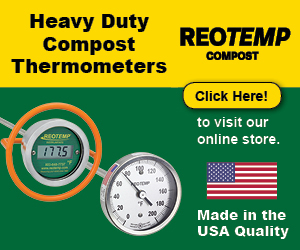
 Natasha Dyer, Senior Recycling Program Coordinator, City of Atlanta, has been with the Young Professionals Group for more than four years. She served as social media coordinator for three years and currently serves as a Mentoring Committee member.
Natasha Dyer, Senior Recycling Program Coordinator, City of Atlanta, has been with the Young Professionals Group for more than four years. She served as social media coordinator for three years and currently serves as a Mentoring Committee member. 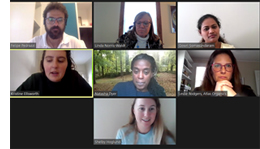 The Young Professionals Steering Committee had their Strategic Planning Meeting for the year 2021 in February led by Chair Kristine Ellsworth. Committee members Felipe Pedrazzi, Leslie Rodgers, Natasha Dyer, Shelby Hogland, along with USCC staff Linda Norris Waldt and Gowri Somasundaram, attended the meeting. The Young Professionals Group continues to grow and provide opportunities for aspiring young members of our industry. Plans for 2021 will be announced soon.
The Young Professionals Steering Committee had their Strategic Planning Meeting for the year 2021 in February led by Chair Kristine Ellsworth. Committee members Felipe Pedrazzi, Leslie Rodgers, Natasha Dyer, Shelby Hogland, along with USCC staff Linda Norris Waldt and Gowri Somasundaram, attended the meeting. The Young Professionals Group continues to grow and provide opportunities for aspiring young members of our industry. Plans for 2021 will be announced soon. Join the USCC Young Professionals Group for happy hour every month. Grab your drink, take that break, meet your fellow YPs. Share your ideas, diversify your business network, and create that new connection in the industry.
Join the USCC Young Professionals Group for happy hour every month. Grab your drink, take that break, meet your fellow YPs. Share your ideas, diversify your business network, and create that new connection in the industry.
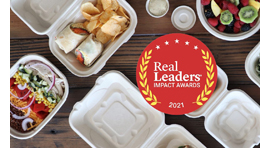
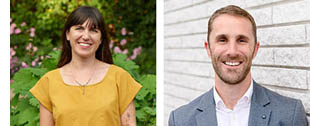
 Ramsey/Washington Recycling & Energy (R&E) is requesting proposals from manufacturers of durable compostable bags (DCBs). DCBs will be an integral part of R&E’s source-separated organics collection program, which will serve the residents and businesses of Ramsey and Washington counties in Minnesota.
Ramsey/Washington Recycling & Energy (R&E) is requesting proposals from manufacturers of durable compostable bags (DCBs). DCBs will be an integral part of R&E’s source-separated organics collection program, which will serve the residents and businesses of Ramsey and Washington counties in Minnesota. BPI is looking for a Business Administrator to report to the Executive Director. Primary responsibilities will be managing accounts receivable/ payable, payroll and taxes. Must email resume today.
BPI is looking for a Business Administrator to report to the Executive Director. Primary responsibilities will be managing accounts receivable/ payable, payroll and taxes. Must email resume today.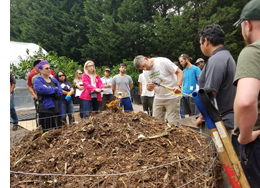 The CREF is busy putting together a full schedule of trainings and other educational opportunities starting in late spring and throughout the fall.
The CREF is busy putting together a full schedule of trainings and other educational opportunities starting in late spring and throughout the fall.